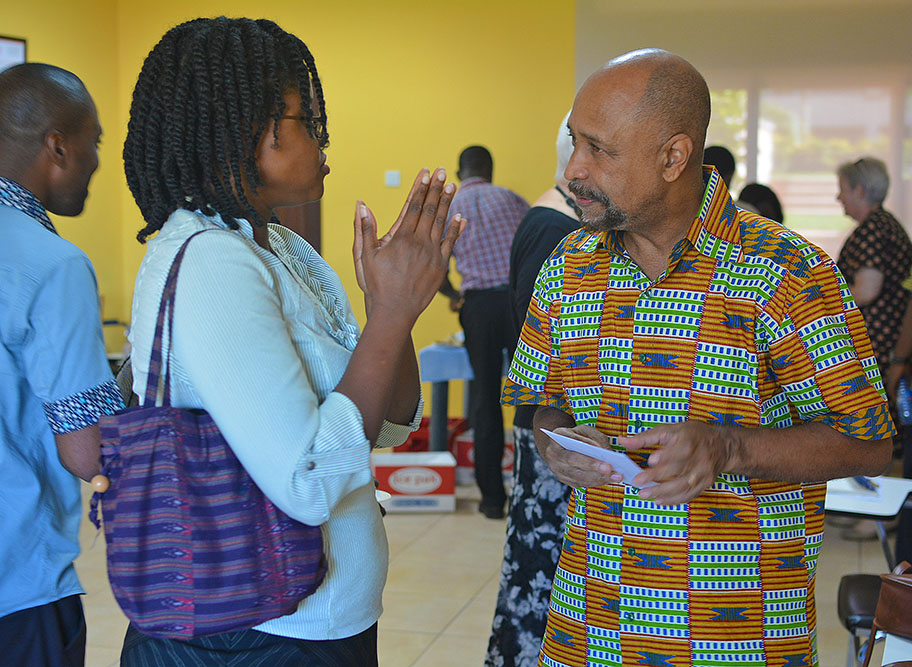There is a computer scientist that may not be as well known to many. This man is,
Clarence Ellis.
I would like to give an introduction to who this man was, what his contributions were and why he is influential in the Computer Science Community.
Ellis was born on May 11, 1943 in Chicago, Ilinois. He died on May 17th, 2014 in Denver, Colorado as he was coming from Ghana. As a young boy, he was very interested in computers, mathematics and physics as a kid. He grew up in Chicago and was a very bright kid at a young age. He started the beginnings of his career at his part-time job where he worked as a security officer to guard the computers at the company he worked for at the time, Dover Corporation.
Working at Dover, he worked as a security guard, guarding computers. He was fascinated by the computers that he got to see every day, so much that he began to learn about the computers himself. The ENIAC (Electrical Numerical Integrator And Computer) was the more general-purpose machine used by non-commercial people, however the UNIVAC (the computer Ellis watched over) was released and introduced for the commercial use in 1951. So, he learned the inside and out of the UNIVAC and was there to repair and fix any issues that came along. Unbeknownst to him, this was the start of his career in Computer Science.
His Contributions
As time went on, Ellis studied mathematics and physics at Benoit College. He loved both subjects so decided to do a double major in them both. At the time, Computer Science wasn’t that popular among universities and only a handful of them offered it as a major. He later enrolled at Massachusetts Institute of Technology (MIT) to pursue his Master's degree, but later left due to his involvement in civil rights. He was very fond of Martin Luther King’s, “I Have A Dream” speech and he wanted to be an educator as well.
"People put together an image of what I was supposed to be...So I tell my students to push."
Ellis was known for many things throughout his life and his career. Clarence Ellis was the first African American to receive a PhD in 1969. He graduated from the University of Ilinois at Urbana-Champaign in 1969, receiving his Master’s Degree in 1966 and his PhD in 1969. After graduation, he later went to work at numerous companies such as Bell Labs, Xerox and IBM. He and his team created OfficeTalk, deemed “groupware” at the time where multiple people could view icons and congregate with people on similar work from far away through ethernet ports. The same concept was in another form called Operational Transformation that allowed to work on the same work together in real-time. It is often said that Ellis’ work gave birth to Google Docs and other similar technologies during our current era. He was also the first African American fellow to be named to ACM (Association of Computing Machinery) in 1988 because of his leadership in the ACM SIGOIS (much like Special Interest Groups in ACM) and the work he accomplished throughout the office systems world with the likes of OfficeTalk and the Operational Transformation.
Pay it Forward
Ellis had a lot of influence over the collective working environment on documents that allowed people to work and see each other’s progress in real-time. This was big because everything was done on one document or one project and was sent over to allow someone else to edit or review documents or projects. This allowed multiple people to work on the same thing regardless where they were located. This is a big inspiration as I’ve said for things like, Google Docs, Apache Wave and many other technologies have adopted this way of working methodology. Ellis was also a contributor to the Human Computing Interface and was interested in the Cognitive Sciences as well. OfficeTalk also introduced viewing icons and Ellis was interested in how humans could interact better with computers and what certain ways to go about it. He was also a contributor in the field of Artificial Intelligence. His dissertation was called, “Probabilistic Languages and Automata.” This gave rise to his imagination of having search engines and having a storage/information retrieval where you list documents by how relevant the search was and ranking it by probability.
 Clarence 'Skip' Ellis talking to a woman after his lecture teaching at Ashesi University in Ghana
Clarence 'Skip' Ellis talking to a woman after his lecture teaching at Ashesi University in Ghana
Dr. Ellis was a very bright man that push past people’s expectations and he accomplished a lot, especially being around people and a society that didn’t look too much like him or care too much about his ideas or ideals. I think his ideas were indeed influential. He created and predicted some great technologies that we all use today, and I think that putting him in the list is of influential people of Computer Science is a very valid case. If not for Ellis and his inventions and creations, I think that we may not have had Tim Berners-Lee working on the World Wide Web (1989). We may not have had Larry Page and Sergey Brin working on Google and the search engine (1998). We may not have thought of a system where we all could work together and use our own individual knowledge to help others. Who knows? Regardless, I hope that we all can work hard to "push" past people's perceptions and be the best that we can be. Now go forth and do great things to hopefully inspire others.
Thank you for reading. Stay tuned for more posts coming soon.
LD
References
CU-Boulder Professor Clarence 'Skip' Ellis remembered as warm, quiet leader
In Memory: Clarence 'Skip' Ellis 1943-2014
Computer Scientists of the African Diaspora - Skip (Clarence A.) Ellis
Clarence 'Skip' Ellis - 2019 Distinguished Achievement Memorial Award